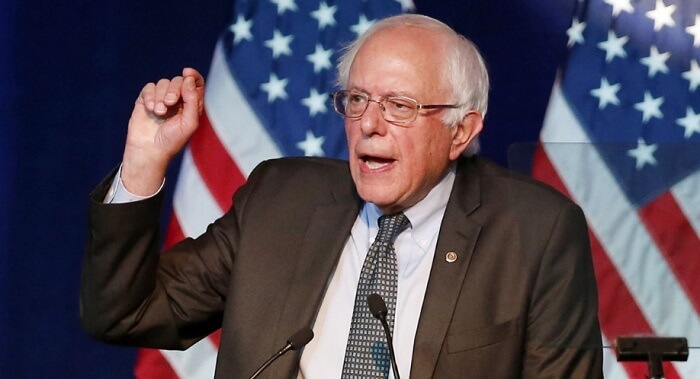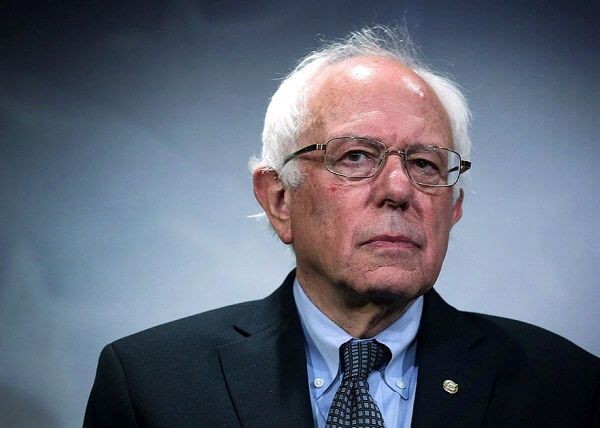Bernie Sanders
A United States Senator representing Vermont since 2007. He is an activist and politician in the United States. Sanders is closely associated with the Democratic Party. Sander is the longest-serving senator in Congressional history; before coming to Congress, Bernie was mayor of Burlington, Vermont. Brief Political InformationUnited States Senator from Vermont (Incumbent) Assumed office: 3 January 2007 Preceded by: Jim Jeffords Chair of the Senate Budget Committee (Incumbent) Assumed office: 3 February 2021 Preceded by: Mike Enzi Ranking Member of the Senate Budget Committee In office: 3 January 2015- 3 February 2021 Preceded by: Jeff Sessions Succeeded by: Lindsey Graham Chair of the Senate Veteran's Affairs Committee In office: 3 January 2013- 3 January 2015 Preceded by: Patty Murray Succeeded by: Johnny Isakson Member of the US House of Representatives from Vermont's at large districts In office: 3 January 1991- 3 January 2007 Preceded by: Peter Plympton Smith Succeeded by: Peter Welch 37th Mayor of Burlington In office: 6 April 1981- 4 April 1989 Preceded by: Gordon Paquette Succeeded by: Peter Clavelle Publications
Sander had actively participated in the civil rights movement, and Sander used to organise a protest for the
Sander was a major potential and heavyweight candidate for the Democratic Presidential Candidate in 2016 and 2020. Sander knew the campaign's chances were very limited, but still, it generated huge enthusiasm among his followers and registered victory against Hillary Clinton in primaries and caucuses. Sanders is known for the democratic socialist ideal, and his influence has made Democratic Party bend toward some leftward ideals. Sanders fiercely advocates for progressive policies and social democratic ideals. He is loud against neoliberalism and economic inequality. He has supported some of the key issues in the United States like:
His views on reducing military expenditure and promoting diplomacy and global cooperation are well known to the community. Early Days of the Bernie SandersBorn: 8 September 1941 Place of Birth: Brooklyn, New York City Father name: Elias Ben Yehuda Sanders Mother name: Dorothy Sanders Elementary Schooling: P.S.197, Hebrew School, and James Madison High School College: Brooklyn College University: University of Chicago Degree: Bachelor of Arts (Political Science) Early Political DaysSander was a part of the Young People's Socialist League and was actively involved in the Civil Right Movement. He had protested in the University of Chicago administration building against the segregated campus housing policy of George Wells Beadle. He was involved in political activities from his college days like:
After finishing college, Sander returned to New York, where he tried jobs like Head Start teacher, carpenter and psychiatric aide. Later he shifted to Stannard, Vermont. Vermont is a tiny town with a very small area and population. Sander has spent a significant portion of time in that area before shifting to slightly populous Chittenden County. When Sander was a member of the Liberty Union Party, he started his career in electoral politics. He fought an election for the Governor of Vermont as a Liberty Union Party candidate. The Political party came out as an anti-war movement. Mayor of Burlington Vermont
Sander announced his intention for the post of mayor. He declared his formal campaign on 16 December. He chose Linda Niedweske for the campaign manager work. The Citizen Party made a move to nominate Greg Guma for the mayor but refused. Guma was convinced that it would not be wise to contest against the progressive candidate. Sander was persuaded by his close associate Richard Sugarman to run for mayor election. Sander registered victory in the Mayoral election against McGrath, Paquette and Bove. Paquette's defeat was largely attributed to his fault. It is being said that Paquette did not ask for much support for his candidate as independent candidates Richard Bove and Bernie Sander did not pose any serious challenge to Paquette because Sander had not registered any victory in the election before. One of the factors of the defeat was his proposal of $0.65/$100 raise in taxes that Sander did not support. Sanders's expenditure on the campaign was $4,000. Sanders's campaign became stronger as he gained support from the Police Union, university professors and social welfare agencies. The amused the local political leader. Sander stitched an alliance between the Citizens Party and independents. Later, Sander sought re-election on 3 December 1982. Citizen Party decided to support Sander, even though Sander was fighting the election as an Independent. He registered victory against James Gilson, and Judith Stephany and Sanders were re-elected. As a mayor, he tried to pose as a socialist, and the media showed him. Under his guidance, the city budget was balanced, and he also improved Burlington's Lake Champlain waterfront. Sander was not in favour of US Foreign Policy in Latin America. U.S. House of Representative
Incumbent Republic Congressman Jim Jeffords (1998) decided to contest for the U.S. Senate and vacated his seat in Vermont's large congressional district. Sander ran independently for the house election and received 38% of the vote. Lieutenant Governor Peter P. Smith registered victory in the election and received 41% of the vote, and the Democratic representative received 19% of the vote and was placed third in the fray. Sander, two years later, decided to contest for the seat and registered victory against Smith. With this victory, Sander reached the United States House of Representatives. LegislationIn his first year, he criticised both the parties and levelled charges against them, working only for the wealthy class. Sander established a Congressional Progressive Caucus that involved liberal democrats. Sander denied becoming part of any member of the party or caucus. Reforms in Banking SectorSanders, in 1999 voiced and voted against taking back the Glass- Stegall legislation that treated Investment banks and commercial banks as separate entities. Sander was a major critic of Federal Reserve Chair Alan Greenspan. Cancer RegistriesOn 7 February 1992, Sanders was deeply concerned by the rise in high breast cancer rates in Vermont. Sander endorsed the Cancer Registries Amendment Act to find cancer registries to enrol cancer information. Patrick Leahy, the Senator, brought Companion Bill on 2 October 1992 in Senate. It was passed by the House and became law when President George H.W. Bush signed it on 24 October 1992. Criminal JusticeSander did not vote in favour of the Brady Bill, which made provisions for Federal background checks while purchasing guns and imposed a restriction on the waiting period on firearms in the United States. A vote cleared Bill 238-187. Sander has supported other measures of gun control. For instance, he supported the Violent Crime Control and Law Enforcement Act, including the Violence Against Women Act provision, but he was very vocal and critical of other provisions of the Bill. Sander has strongly advocated for stronger law enforcement and strict punishment. He favoured a law that would increase the minimum sentencing (ten years of prison) for possessing a gun while doing federal crimes. He also did not favour police buying tanks and armoured vehicles. Sander also supported the Protection of Lawful Commerce in Arms Act in 2005. The act contains a provision in which firearms manufacturers and dealers will not be made liable for negligence when crimes have been done using their product. Opposition to the Patriot ActSander has opposed the original Patriot bill being a member of Congress. He is very vocal against the Patriot Act. The vote cleared Bill 357-66, and he supported and opposed many amendments and acts to limit the scope of the Bill. He also made suggestions to limit the provisions of the Patriot Act and give power to State to take personal book-buying and library records. Opposed to War in IraqSanders was not in favour of the brutal authorisation use of force in 1991 and 2002 against Iraq. He also did not support the invasion of Iraq, but he supported the Authorisation for the use of Military Force Against Terrorists that had legal justification after 9/11. He favoured a non-binding resolution and pledged his support for the forces before the invasion. Trade PolicySanders, in February 2005, brought a bill that sought to withdraw the permanent normal trade relations status given to China. U.S. Senate: 2007- Till PresentAfter Senator Jim Jeffords decided that he would not ask for the fourth term, Sanders entered the fray for the U.S. Senate on 21 April 2005. He received the support of his fellow James Madison High School and chair of the Democratic Senatorial Campaign Committee, Chuck Schumer. Former Governor of Vermont Howard Dean, Democratic National Committee and Senate Minority Leader Harry Reid have also endorsed Bernie Sanders's candidature. Barack Obama, then-Senator, also campaigned for him in Vermont. He defeated Rich Tarrant, a businessman tycoon, which was one of the most expensive elections in Vermont's history. Being Senator, he was part of the various committee assignments:
2012 Senate ElectionHe registered victory in the 2012 Senate Election and received 71% of the vote. 2018 Senate ElectionHe again registered victory in this election and received 67% of the vote. Legislative WorksAs a house senator, he proposed 15 senate resolutions and 15 concurrent resolutions. Resolutions which he co-sponsored, 218 of them become law. As a senator, he proposed several amendments, and several of them turned into law. Some amendments included $100 million in funds for the Community Health Centres and $10 million for an outreach program for service members suffering from panic attacks, posttraumatic stress disorder, depression, traumatic brain injury and other mental disorders. He also supported the newly introduced bill called Inflation Reduction Act 2022. Finance and Monetary PolicySanders did not support the Troubled Asset Relief Program in 2008 and 2009. It was a program that proposed purchasing bad banking assets and suggested measures to provide loans to those banks that were in free fall. Foreign PolicyAll Senators agreed to impose new sanctions on Russia except Senator Sanders and Republican Rand Paul. Sanders proposed a bill and agreed with Senator Chris Murphy and Mike Lee to use the 1973 War Powers Resolutions to end US endorsement for the Saudi-led military intervention in Yemen that has caused mass destruction and immense casualties. Healthcare IssueSanders successfully inserted a provision in the Affordable Care Act and raised $11 billion for community health centres. Immigration PolicyHe favoured DREM Act and supported the Gang of Eight's comprehensive immigration reform bill. Income and Wealth DistributionSander brought a bill that seeks to enhance the minimum wage for the federal contract worker to $ 15 an hour over the earlier proposal of $12 an hour. He also brought the Workplace Democracy Act, increased the scope of labour rights and smoothened the process of workers being a part of a union. Veteran AffairsHe proposed the Veteran's Access to Care Through Choice Accountability and Transparency Act of 2014 to bring improvements to the Department of Veterans Affairs. Sanders's position on Global and Political IssuesHe admires the Nordic Model of Social Democracy and his strong advocate of Workplace democracy. Climate ChangeSanders sees the threat of climate change as real and demands concrete steps to undo the effect of climate change and Global Warming. He bats for energy efficiency measures, sustainability and a significant portion of investment in the infrastructure.
Next TopicGeeta Kapoor
|
 For Videos Join Our Youtube Channel: Join Now
For Videos Join Our Youtube Channel: Join Now
Feedback
- Send your Feedback to [email protected]
Help Others, Please Share










